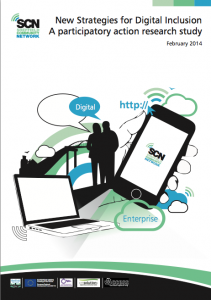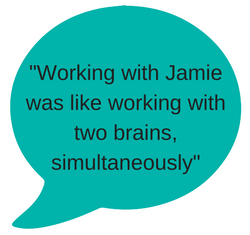 New Strategies for Digital Inclusion – A participatory action research study
New Strategies for Digital Inclusion – A participatory action research study
New and innovative digital tools and strategies are available to businesses (including social enterprises), communities and individuals.
- Can these emerging and developing technologies and services promote entrepreneurship?
- How can mobile technologies be used to develop existing businesses and social enterprises and to support new ones?
- Can web 2.0 and cloud computing technologies be deployed at community level to enhance existing community media enterprises and to start new ones?
- And what potential do new physical computing technologies, practices and value chains (including design and manufacture, analysis and remanufacture) offer to businesses and social enterprises?
Sheffield Community Network (SCN)’s digital inclusion pilots set out to answer these questions through a programme of participatory action research. Working with SCN partners, and specifically with Andi Stamp, I co-lead and authored the Digital Media on the Move segment of this research during 2013-4.
The pilots aimed to increase understanding and test the potential of the new technologies to support businesses and social enterprise; promote and encourage social entrepreneurship; and provoke and support new business ideas. The pilots conducted action-oriented research, through neighbourhood-based workshop activities, focussing on three areas of new technology:
- Digital Media on the Move – Mobile platforms to access, make and share digital media content [this was the pilot project which Andi Stamp and I ran]
- Virtual Enterprise in the Cloud – Web 2.0 technologies and cloud computing for social enterprise
- Physical Computing Laboratory – New tools, machines and processes that manifest the digital as physical products
The purpose of each pilot was to inspire, innovate, test and demonstrate the technology, acting as a catalyst and a context to identify and engage new and potential micro-enterprises.
Each pilot explored questions around: the transformative economic and community development potential of the technologies under investigation; the practical feasibility of their implementation, including factors that either inhibit or encourage effective usage; the sustainability of engagement with such technologies.
In short: the technology can be of great benefit to businesses and social enterprises. We made specific recommendations to businesses and entrepreneurs, to policymakers, to investors, to educators and to the business support sector.
You can read the key findings and the recommendations from the research in:
– the full research report (PDF, 46pp, divided into 5 chapters – Introduction; Digital Media on the Move (including specific recommendations); Virtual Enterprise in the Cloud (including specific recommendations); Physical Computing Laboratory (including specific recommendations); Summary and Recommendations.
– the summary report (PDF, 6pp, Introduction, executive summary, comparison and recommendations).



Speak Your Mind